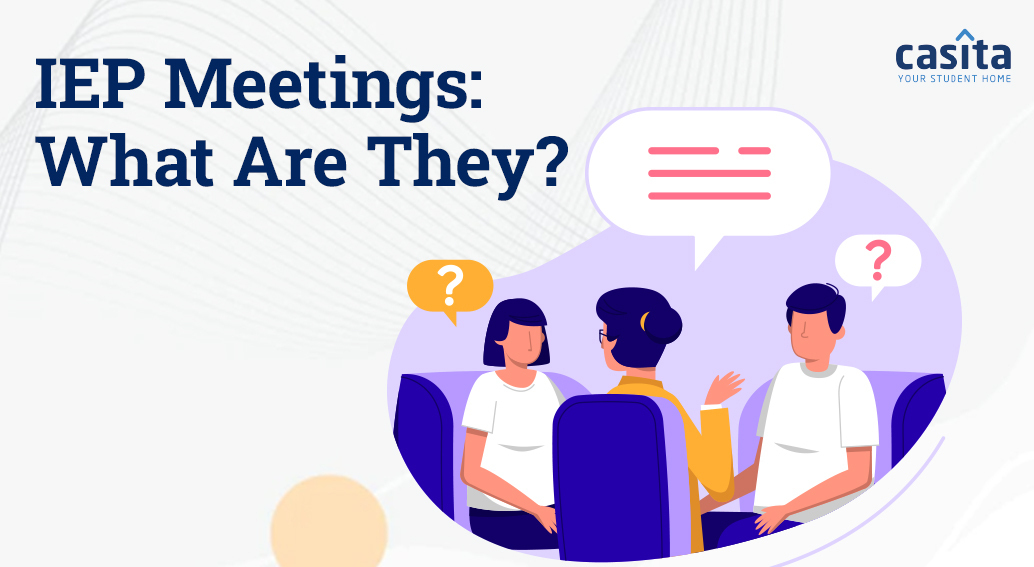IEP Meetings: What Are They?
Tips and Advice
29 July, 2022
|
5 mins read
By Amira Adel
Share

IEP Meetings: What Are They?
Tips and Advice
29 July, 2022
|
5 mins read

By Amira Adel
Share
IEP is a legal document known as a "individualized education programme" (IEP) created for each public school student in the United States who requires special education. It is created by a group of parents and district employees who are familiar with the needs of the child.
The purpose of IEP meetings is to discuss, develop, and review a student’s IEP. Every year, schools are required to hold an IEP meeting to review students' progress. However, parents have the right to call an IEP meeting anytime for specific issues.
There are rules for IEP meetings. They cover who must attend and what happens. The best method to understand these guidelines is to keep the meeting's objective in mind. Planning a student's special education experience at school is a joint effort between the parents and the school.
Notice of the IEP Meeting
The school must notify parents or guardians of the time, date, and location of an IEP meeting before it takes place. The purpose of the meeting and the attendees' names must be disclosed.
It's crucial that parents have the option of attending. This entails picking a time and location for the meeting that works for everyone. It may also refer to conducting a conference call or online video meeting.
Know Your Rights
Do you have an IEP for your child? Or is your child being assessed for services in special education? If so, it's crucial to understand that you and your kid have legal safeguards and rights throughout this procedure. These safeguards are provided by the Individuals with Disabilities Education Act (IDEA). Procedural protections are what they are known as.
Procedural Safeguards Notice
Your rights under the IDEA and the laws of your state must be explained in writing by the school. You will receive a printed copy of this procedural safeguards notification. You could also request a spoken justification.
Parent Participation
Parents are entitled by law to attend meetings pertaining to their child's education, including IEP sessions. An IEP team meeting can even be called whenever they like.
Access to Educational Records
You have the right to access your child's academic records and request an explanation. Requesting corrections is another option. IDEA and the Family Educational Rights and Privacy Act both safeguard these rights (FERPA).
Confidentiality of information
The school is required to maintain your child's privacy. This contains personal data about your child, such as their name, address, social security number, and other information. But there are some exceptions.
Informed Consent or Parental Consent
The school must let you know what's involved before evaluating your child or offering special education services for the first time. Before the school may proceed, you must offer your written consent.
Prior Written Notice
Before making any changes to how your child receives special education, the school must provide you written notice. This covers situations where the school wants to offer or refuse assistance. It must explain the proposed action and its justification.
Understandable Language
The school must use language that the general public may understand when giving written notice. The notice must be in your native language as well (this includes Braille).
Independent Educational Evaluation (IEE)
You have the right to request an IEE if you disagree with the evaluation results provided by the school. An IEE is a review of your child's abilities and requirements conducted by a non-school staff. The IEE results must be taken into account by the school. The results need not, however, be accepted by the school.
“Stay Put” Rights
Do you object to a proposed modification to the IEP services or placement for your child? The "stay put" safeguard maintains your child's current IEP while you and the school try to come to an agreement. However, you need to act quickly.
Dispute Resolution Options
Regarding what's best for your child, you have the freedom to disagree with the school. IDEA offers you a number of dispute resolution solutions if you and another party cannot agree.
You can negotiate and clarify issues with the school. Alternatively, you and the school can try to resolve a disagreement through mediation, where a neutral third party assists you. Additionally, you are entitled to a fair trial, which begins with a written complaint and finishes with a decision following a hearing.
If you think that the school is breaking the IDEA, you can complain to your state government. If you think your child has been the victim of discrimination, you can also submit a complaint with the Office for Civil Rights of the U.S. Department of Education.

The First IEP Meeting
The first IEP team meeting is held after a school has evaluated a student and determined that the student qualifies for special education. This meeting must take place within 30 days of eligibility, according to the law. This meeting is crucial. It's also the time the IEP is created.
The school and the parents talk about the student's needs based on the findings of any evaluations during the meeting. They then talk about the student's needs for services and support. The initial IEP contains this information.
Some schools give parents a suggested draft IEP to think about during the meeting. As long as the IEP isn't predetermined, this is acceptable. Parents must be given the opportunity to offer their opinions and express what they believe belongs in the IEP.
Annual (and Other) IEP Meetings
An IEP meeting must be held at least once a year after the IEP has been created. This is called the annual IEP meeting.
Schools frequently evaluate student progress at the yearly IEP meeting. They assess the student's development in relation to grade-level expectations. They also alter the IEP if any adjustments are required.
Some students could require IEP meetings more frequently. There is always a chance for new challenges.
If there is a problem, parents don't have to wait until the annual meeting. They are always free to ask for an IEP meeting any time.
Who Attends the IEP Meetings?
A group of specific people - called the IEP team - are required by the law to attend every IEP meeting:
A parent or guardian of the student
At least one of the student’s general education teachers
At least one of the student’s special education teachers
A school district representative who has the power to approve services and resources
An expert like a school psychologist who can interpret the student’s evaluation results
The student must attend once the IEP team starts to create a transition plan for after high school. At age 16, this takes place. If they're ready, students will occasionally attend the meetings even sooner.
You could also extend an invitation to other people. For instance, a parent might request the attendance of a medical professional, as well as a friend or advocate.
An IEP team member can be excused from attendance with the consent of the parents and the school. However, it's always preferable to reschedule so that everybody can attend.
What’s Discussed and Decided at The IEP Meeting
IEP meetings can cover a range of topics.
Sometimes the focus of the entire meeting can be on solving a single issue. The student might not be receiving services that are mentioned in their IEP, for instance. Or perhaps services need to be modified. Conflicts with teachers or other students could also happen. If so, the meeting frequently concludes with the parents and school coming to a decision about what to do, including modifying the IEP.
The student's overall growth will be the main topic of discussion at the annual IEP sessions. The student’s current performance will be examined by the parents and the school. This is based on facts like grades or test scores. Then, the team will examine progress toward annual goals and the student’s individual supports and services. The team could decide on changes based on how the youngster is doing. A new IEP draft is another option they have.
There you have it! Know the rules and regulations of the meetings, as well as know your rights, and know that if carried out correctly, IEP meetings are a great benefit to students who need special care and special education.
Tips and Advice
By Amira Adel
Share
Tips and Advice
By Amira Adel
Share



